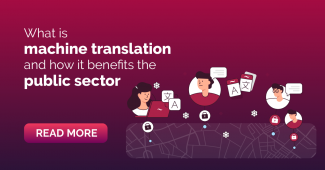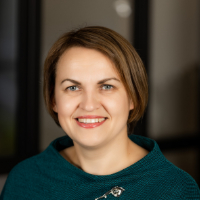
There are currently around 7,111 known languages and dialects in the world, and the European Union accounts for more than 200 of them. How can governments reach such a diverse population and make information accessible to everyone? Wouldn’t it be amazing to have a magic wand that could instantly turn piles of complicated texts from one language into another? Today Machine Translation (MT) can break these language barriers and provide multilingual information with just one click! MT has a long history of helping governments to boost multilingual communication and provide information inclusivity.
The use of MT in public administrations is nothing new – it has been around for a long time and the demand for translation services continues to grow, especially in countries with more than one official language. For example, in 2018 Denmark tendered out a EUR 70 million interpretation services contract for 12 government agencies, while in the Netherlands, the Ministry of Justice tendered out EUR 8 million for translation services. These examples demonstrate that MT is an inalienable part of our multilingual society and goes hand in hand with the digitalisation of EU Single Market services.
Oxford Dictionary defines MT as “the process of translating language by computer”. But what lies behind these words exactly?
Nowadays this technology has evolved into Neural MT, which unlike the traditional translation by phrase, where words are interpreted separately, builds a neural network that reads a full sentence and considers context, thus providing fluent translations. It is worth mentioning that a computer is no longer necessary to get the complete MT experience – everyone can access this technology by just using their smartphone. Since MT helps to provide the secure real-time translation of texts, documents and websites, it is the most productive way to improve relations between people and countries, as well as to make international communication swift, secure and quick. MT allows to instantly provide information in different languages and make it available to everyone, helping human translators to work effectively – translate more data in a shorter time.
Safe solution for government institutions
One of the most alarming issues for public authorities during the ongoing digital revolution and development of cybersecurity threats is data protection and confidentiality. Many public institutions have already adapted secure machine translation solutions a long time ago to minimise surveillance risks. Free services usually come at a cost with regard to the privacy trade-off, such as the use and sale of personal data to third parties or advertising agencies. Unfortunately, some ministries and government institutions still translate sensitive and limited access documents and e-mails on free online translation services. Moreover, it can be dangerous as free online services do not guarantee complete data security and privacy protection, causing a high risk of leakage of sensitive information. Secure and custom MT solutions that are offered by language technology companies, such as Tilde, on the other hand, ensure fast and protected multilingual information access and exchange among public sector employees. Data and translations are not stored or analysed and are immediately deleted after translation. All translations are processed on secure EU servers, which prevents data breaches and limited access information being passed on to third parties.
Where can MT be used?
MT can be used everywhere – on a local, national and even international scale. For example, MT can be integrated into operations of public administrations, intelligence, law enforcement, government institutions, communication and media agencies, NGOs, scientific research and university language facilities, among others. Secure translation solutions keep science, innovations and technology locally relevant and provide multilingual information inclusivity.
In this multilingual era, with the help of MT, professional translators continue to support effective dialogue and develop mutual understanding between EU countries. Multilingual websites and translation platforms are now more than ever standing for equality, development and accessibility of knowledge for everyone.
MT integration into e-services portals enables citizens and residents to access information in their preferred language, allowing the government to communicate with everyone equally, speed up information exchange, reach global audiences and celebrate linguistic diversity.
How can you get started?
One of the most vital steps when diving into MT – defining problems that technology needs to solve. MT can help to improve internal or external communication among multinational people or ensure information inclusivity by offering a website with access to information in different languages. Moreover, translators can integrate MT in their professional work environment to provide high-quality services and boost translation productivity.
Institutions looking to adapt MT need to carefully examine the offers available on the MT market and choose the most suitable and safe technology partner to bring their ideas to life. Among the most successful and innovative language technology companies is Tilde, which has truly unique experience in helping the public sector. It is a trusted digital partner for the European Commission and has supported the Presidencies of the Council of the European Union since 2015 including Latvia, Estonia, Bulgaria, Austria, Romania, Finland, Croatia and Germany.
